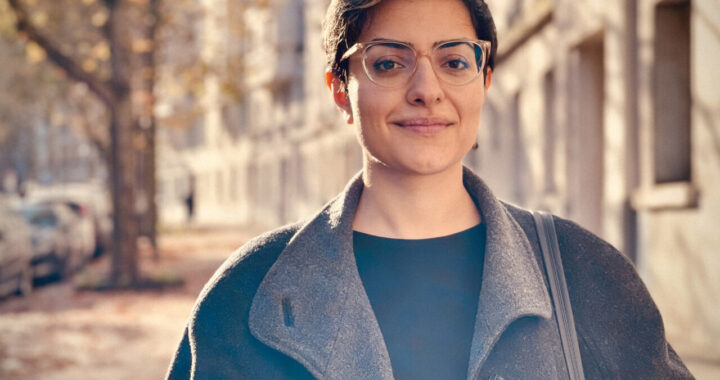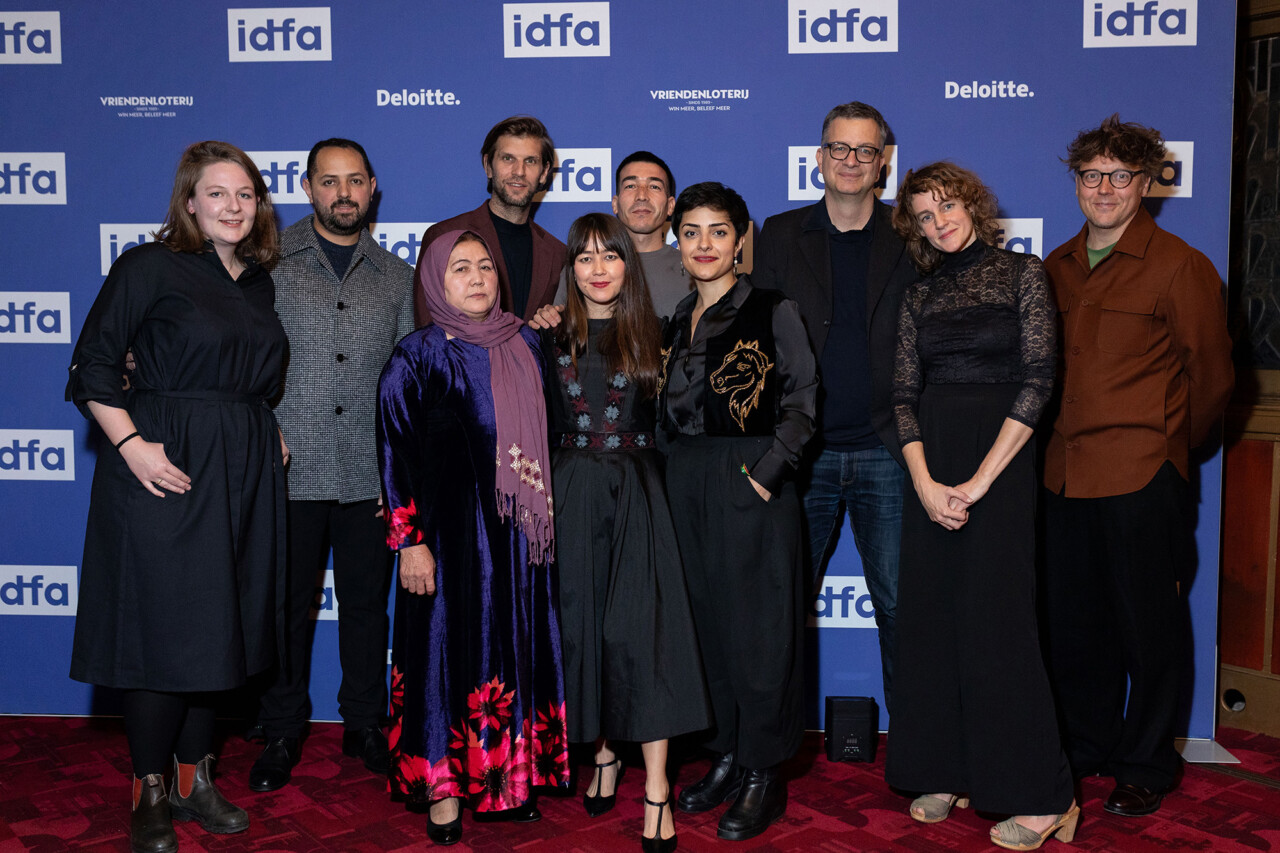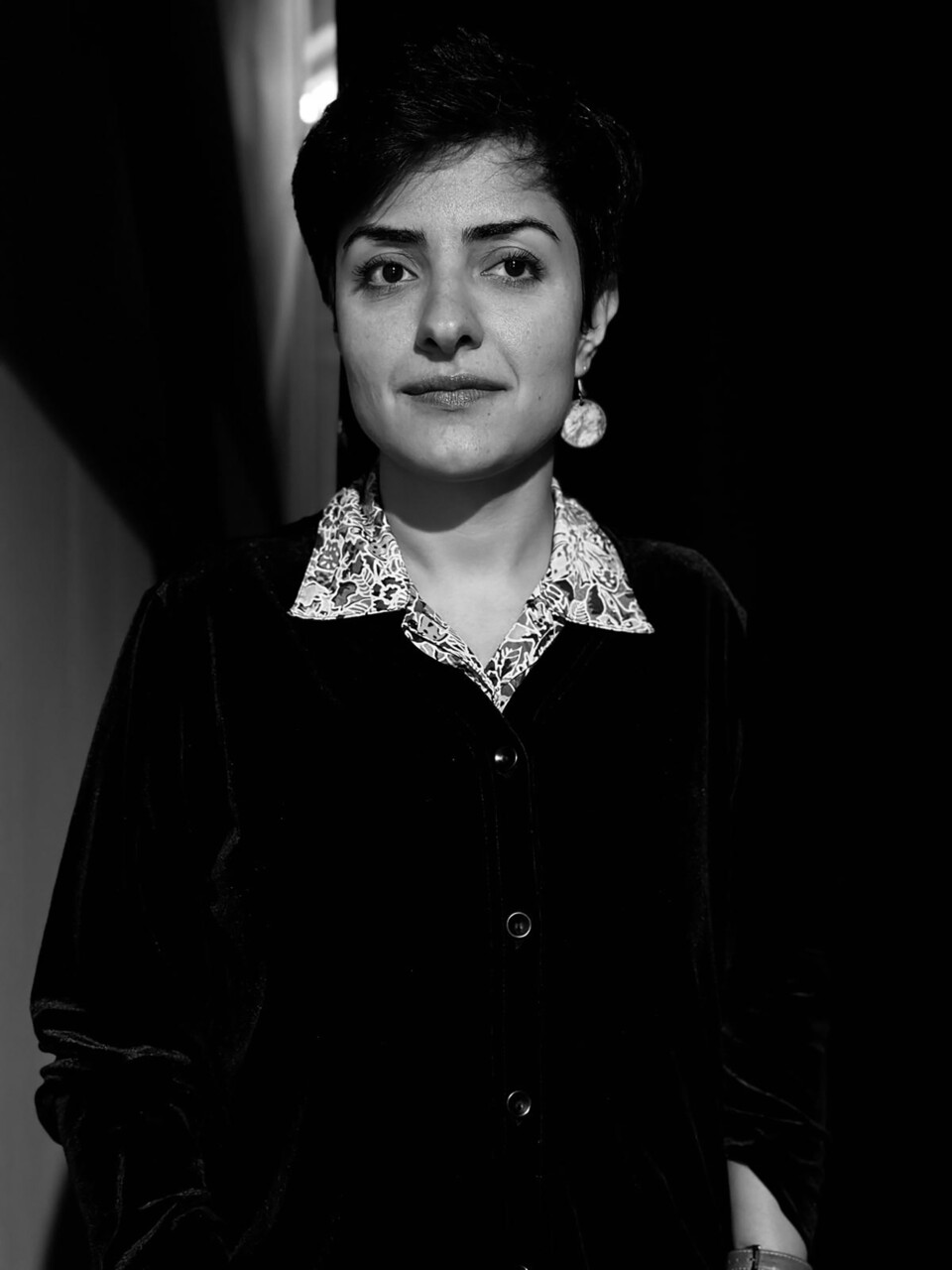‘Writing Hawa’ directed by Najiba Noori (an Afghan journalist and documentary filmmaker) in collaboration with co-director Ali Noori, had its world premiere in the International Competition section of the 37th International Documentary Film Festival Amsterdam (IDFA) . This work, which, in the words of IDFA, “shows in detail how the arduous improvement of the position of women is undone by geopolitical violence,” was warmly received by audiences, critics, and the media, earning the FIPRESCI Prize (awarded by the International Federation of Film Critics) at this year’s festival.
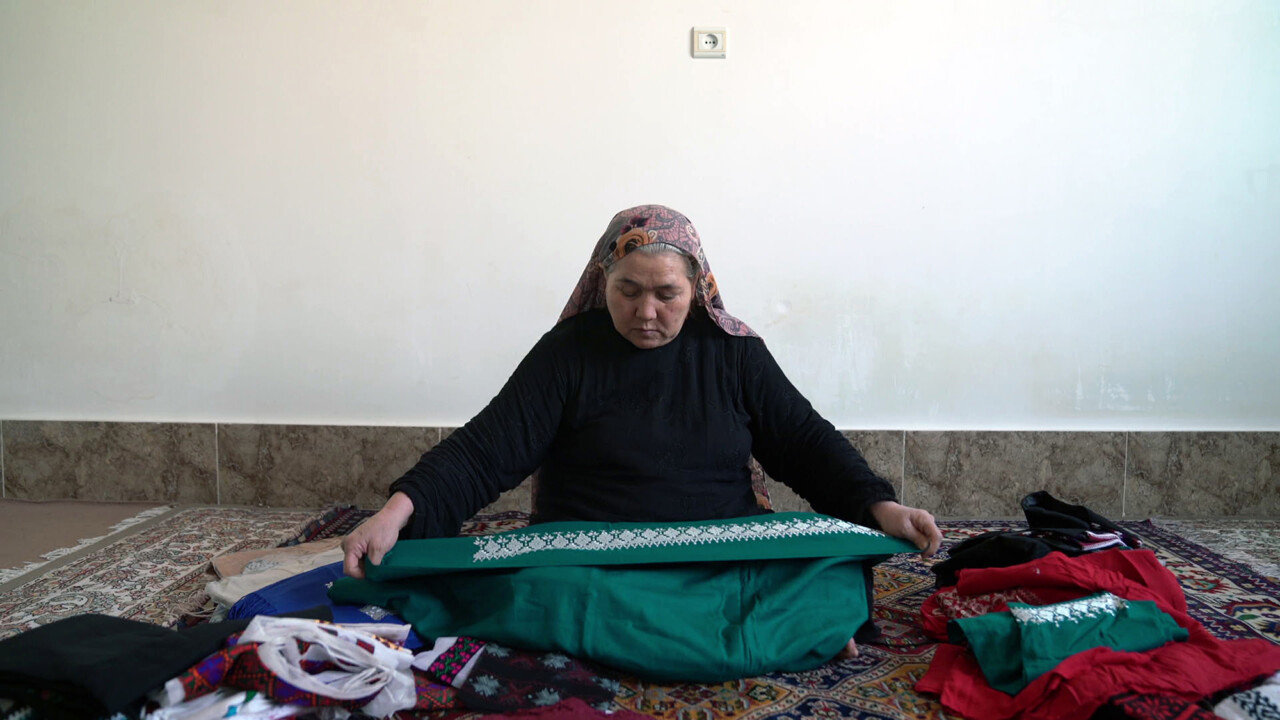
A scene from the feature documentary ‘Writing Hawa,’ directed by Najiba Noori. / Courtesy of IDFA 2024.
In this interview, Afsaneh Salari talks about her acquaintance with Najiba Noori, how she joined the team of ‘Writing Hawa’ and co-authoring the project, the challenges in editing the documentary, and the reception of the film at the 2024 IDFA.
How did your acquaintance with Najiba Noori, the director of ‘Writing Hawa,’ come about?
Before ‘Writing Hawa,’ I had worked on two other projects about Afghanistan: ‘The Silhouettes,’ which I directed, and ‘The forbidden strings,’ which I produced. Both films are related to Afghanistan. Through these two films, Najiba Noori, who was living in Afghanistan and working as a journalist for Agence France-Presse (AFP), knew me. After the fall of Kabul in 2021, she was one of the journalists and artists who left Afghanistan through France. After Najiba arrived in Paris, I contacted her, and we met in person.
How did this acquaintance lead to collaboration on ‘Writing Hawa’?
I had previously worked on projects related to Afghanistan. I have a good command of Dari Persian and also understand the Hazara dialect to some extent. Additionally, the subject of the film was a personal concern for me, and before Najiba suggested the editing role to me, we had already discussed the film, and she knew my stance and perspective. So, we started authoring and editing together. At the same time, we were in contact with Ali Noori, the co-director of the film. Some of the shooting was still ongoing in Kabul, and Ali would send us the dailies. The editing process took about a year and a half.
‘Writing Hawa,’ participated in workshops, including IDFA’s “Project Space” in the Netherlands and the Doha Film Institute’s “Qumra” in Qatar. These opportunities allowed us to benefit from others’ feedback and successfully bring the project to completion.
You and Najiba Noori are credited as co-authors of the film. You mentioned the authoring process in your previous response. How would you define your role as an author in this film? Does this mean you were directly involved in shaping the events and story of the film?
In a documentary film, the author is the person responsible for the creative aspect of the project and has direct involvement in this part. The role of the author goes beyond that of the editor and influences the storytelling style and the creative approach to the narrative. In France, these roles can be completely separate, meaning the writer, director, and editor can be different individuals. The author is the one who shapes the creative direction of the story and defines the project’s creative approach. This doesn’t mean simply sitting down and writing on paper, but rather, the author tries to extract the creative language of the project in the best possible way. Sometimes, the author is involved with the project from the very beginning (usually the director), and in some cases, the editor can also take on the role of the author because their work goes beyond editing and becomes closely tied to the creation of the project itself.
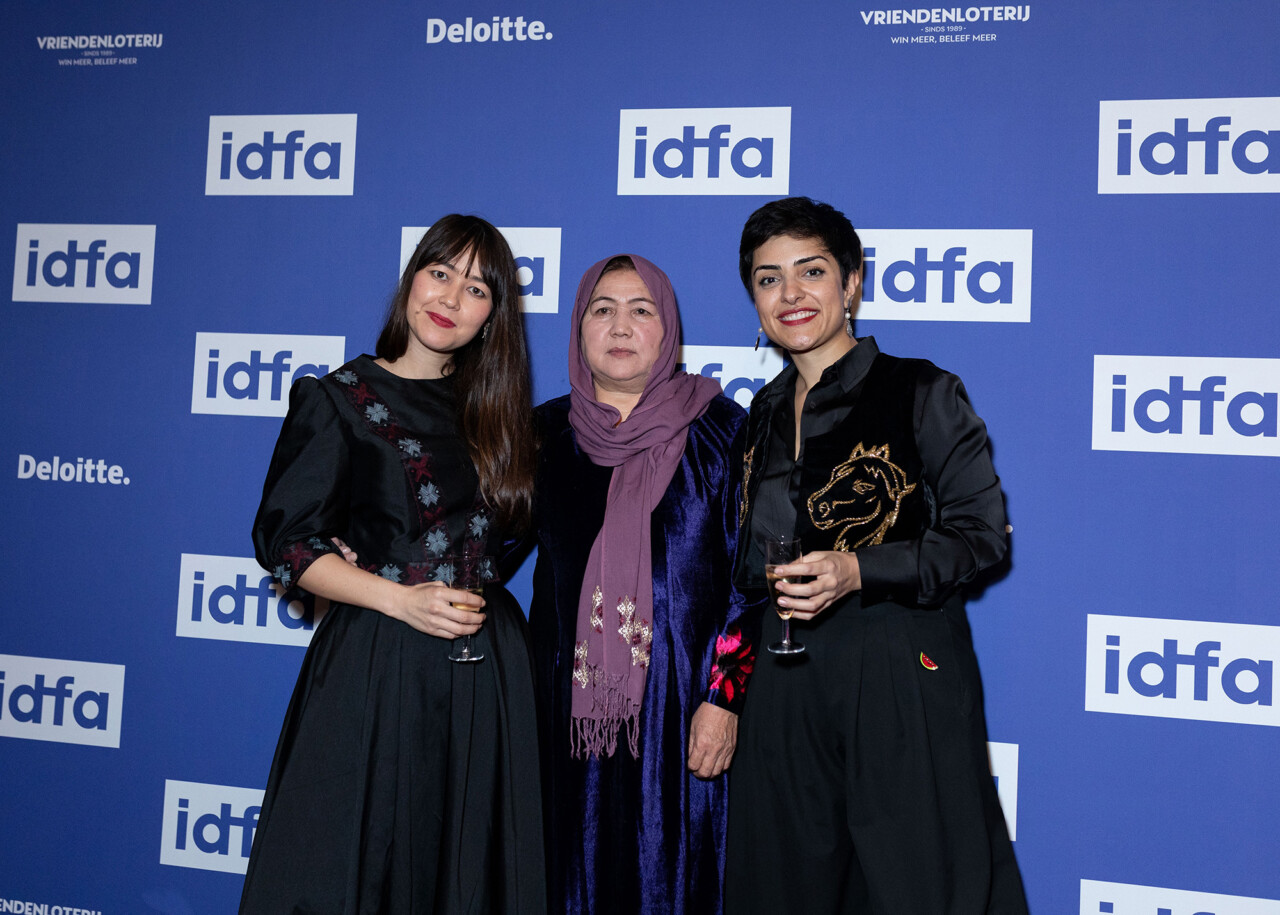
(LTR): Najiba Noori, Hawa, and Afsaneh Salari at the world premiere screening of ‘Writing Hawa’ at IDFA 2024. / Photo: IDFA 2024.
Part of the film is dedicated to the story of Zahra, Najiba’s niece. It seems that the “editing and authoring” partnership played a significant role in the decision to include this storyline in the film.
At the beginning, Najiba and Christian Popp (producer of the film) were unsure whether Zahra’s story could fit into the film, as it was quite different from the other parts of the film and could have been an independent short film. However, during the editing process, we realized that Zahra is a mirror of Hawa and somehow reflects her character. The inclusion of this story in the film was very important, as it allowed us to better define the story of Hawa—the story of today’s girls in Afghanistan who cannot go to school due to the presence of the Taliban. Through Zahra’s story, we could re-engage the audience with this narrative. This story is a very important element of the film and had to be included. Of course, integrating this part into the overall narrative of the film and aligning it with the main story was a challenging task. This was also part of the creative process, during which Najiba and I made the creative decisions together.
In some parts of the film, we hear Najiba’s voice-over. Was this presence planned from the beginning, or did you arrive at it during the creative process of “editing and authoring”? Also, what is the role of the voice-over in ‘Writing Hawa’?
One of the important parts in this creative process was writing the voice-over. In ‘Writing Hawa,’ the voice-over functioned as a highly effective storytelling tool; both to explain and clarify certain facts and to better articulate the story. At the beginning, when Najiba started making the film, she had a completely observational approach. However, during the editing phase, we realized that she herself was a key character in the narrative. Even in the third act of the film, her presence plays a significant role through her absence.
For this reason, we decided that her voice should be present in the film from the very beginning to give the story more cohesion. Although Najiba was initially not in favor of using voice-over, I believed that this tool could be used creatively and should not simply be considered a conventional or television-like element. In the end, we sat down together and wrote the voice-over so that Najiba’s voice would function as part of the story’s identity.
I’d like to ask about your creative freedom as an editor. Since first-time directors tend to be very detail-oriented and protective of their work, did you feel restricted or limited in any way while working with Najiba Noori?
My collaboration with first-time directors as an editor is not always easy, as they are often unfamiliar with the dynamics of team work and the relationship between the director and editor, and sometimes experience severe anxiety, which impacts the work process. However, the situation was different with ‘Writing Hawa.’ As an editor, I had complete creative freedom, and there was mutual trust between Najiba and I. This project was one of the most enjoyable I have ever edited. ‘Writing Hawa’ was a film that emotionally engaged me deeply, because what has been happening in Afghanistan since its fall to the Taliban is something that deeply troubles me. Throughout the project, the energy born from the helplessness and anger I felt due to the Taliban’s presence in Afghanistan gave me extra motivation to put my best effort into ‘Writing Hawa.’
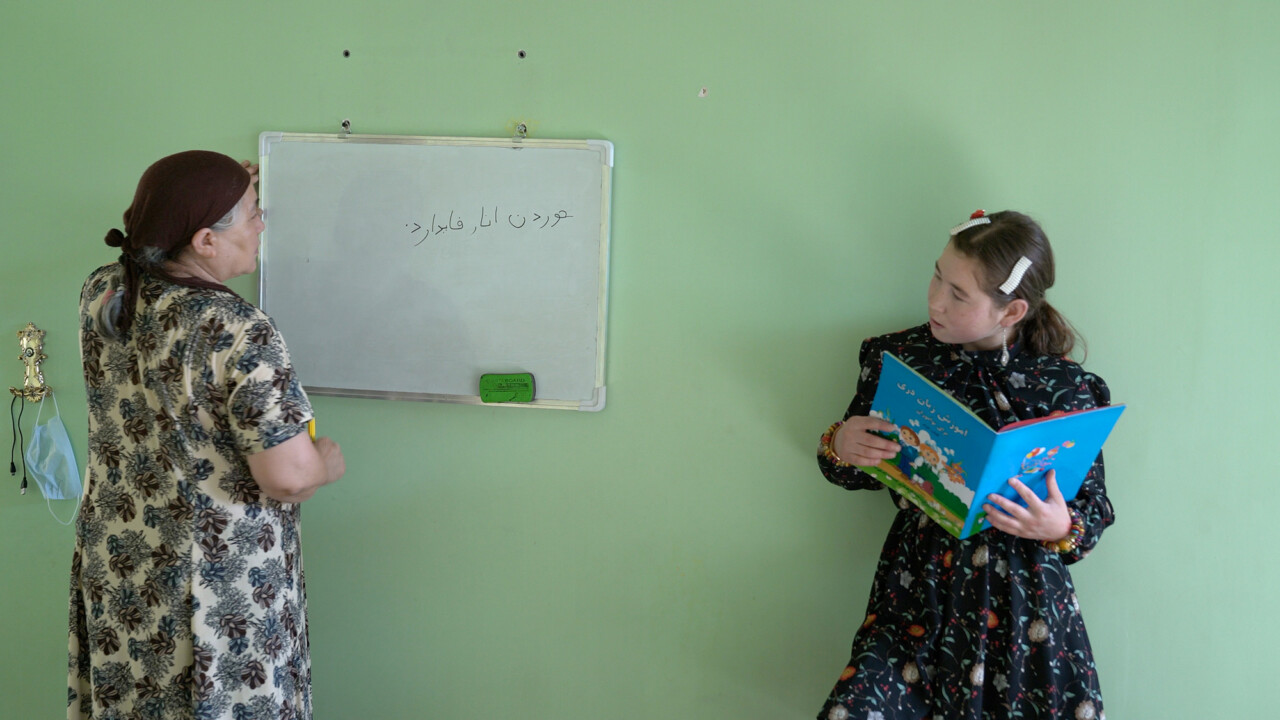
A scene from the feature documentary ‘Writing Hawa,’ directed by Najiba Noori. / Courtesy of IDFA 2024.
In the first two-thirds of the film, we see a meticulous approach to storytelling and narrative progression; However, in the final third, which coincides with the Taliban’s rise to power and their presence in the city, the story seems to move toward its conclusion at a faster pace. Was this change in narrative rhythm intentional, or were there specific reasons behind it?
This feeling may stem from a shift that occurs at the beginning of the third act of the film—a shift in storytelling brought about by adopting a broader perspective on Afghanistan. We move away from the single-character story of Hawa, which is primarily followed within the confines of her home and in a linear manner, to present a larger picture of Afghanistan—from news to the gradual changes and events unfolding. The simple story that begins with the life of one woman in her home now transforms into a narrative about all women, all children, and all exiles.
In editing, we deal with two types of time: external time, which indicates the exact duration of each scene (for example, one minute), and internal time, which shapes how the audience perceives the passage of time. I agree that in the third act of the film, the audience experiences time more quickly. The final third of the film portrays and reflects the dominance of the Taliban. In the earlier acts, we first observe the presence of the Taliban and its effects; however, in the third and final act, this dominance is directly depicted.
During filming, was Najibeh’s life threatened by the Taliban in any way?
Three days after the fall of Kabul, Najiba left Afghanistan. Unfortunately, however, her brother Ali, the film’s co-director, was threatened and beaten by the Taliban.
How were the scenes of the Taliban’s presence in the city, shown in the final third of the film, filmed?
Some were filmed by Ali Noori, Najiba’s brother and the film’s co-director. In other parts, we used archival footage—recorded by others, including friends of Najiba, which we purchased. These videos were mostly mobile phone footage. Particularly, the ones we see at the height of the film with the arrival of the Taliban—events happening in the streets and markets, everything closing down and the streets becoming empty—were all captured by Ali.
Let me ask a question outside the scope of the interview: If Najiba Noori hadn’t worked as a journalist for Agence France-Presse (AFP), do you think it would have still been possible for her to leave Afghanistan?
In my opinion, during the fall of Kabul, the selection of individuals by Western governments for evacuation from Afghanistan was largely based on the level of danger they faced. Filmmakers, artists, singers, and journalists were at the forefront of these threats, and their lives were at greater risk than others. Najiba, as an employee of Agence France-Presse (AFP), was also in this category, and they felt a sense of responsibility for ensuring her safety.
The bitterness of the situation, however, was that there was a kind of elitism involved. People who were active in the fields of culture and art and were more well-known were evacuated first, as their fame made them quicker targets for the Taliban. Najiba, due to her serious work and the articles she had previously written against the Taliban, was certainly on their list of targets.
If Najiba had only been a first-time filmmaker and hadn’t worked at Agence France-Presse (AFP) or had any other well-known activity, the likelihood of her leaving Afghanistan would have been much lower. She might have been forced to stay in Afghanistan and face a different fate.
What was the audience’s response and reception of the film at the IDFA festival, in your opinion?
The reception of the film was very positive, especially because Hawa herself was present at the first screening. In documentary screenings, the presence of the main character (the protagonist) has a huge impact. The fact that the audience can see the story of someone’s life on the screen and then have the opportunity to connect with the person directly, sharing their emotions with them, is incredibly powerful. In my opinion, this experience was truly amazing.
At IDFA’s awards ceremony, did you expect the film to receive the FIPRESCI Prize?
Given the feedback we received from the audience during the film’s world premiere and the fact that the film was consistently among the top five audience favorites, we felt there was a chance the film could receive an award. Personally, I thought the film might win the IDFA Award for Best First Feature, but I really didn’t expect the FIPRESCI Prize.
Receiving the FIPRESCI Prize was a very positive event. After all, this award is given by film critics and carries significant cinematic value. I think for Najibeh, having her first film recognized by critics with this award is very prestigious, and it shows that the film has cinematic merit. In my opinion, it’s very important for any documentary filmmaker that such recognition of value is acknowledged.
When ‘Writing Hawa’ was announced as the winner, what emotions were stirred among you and the film’s team?
When the film was announced as the winner, we were all extremely happy. We felt that this award could help the film gain more visibility and amplify Najiba’s voice and the voices of Afghan women. This was what brought us together in making the film.
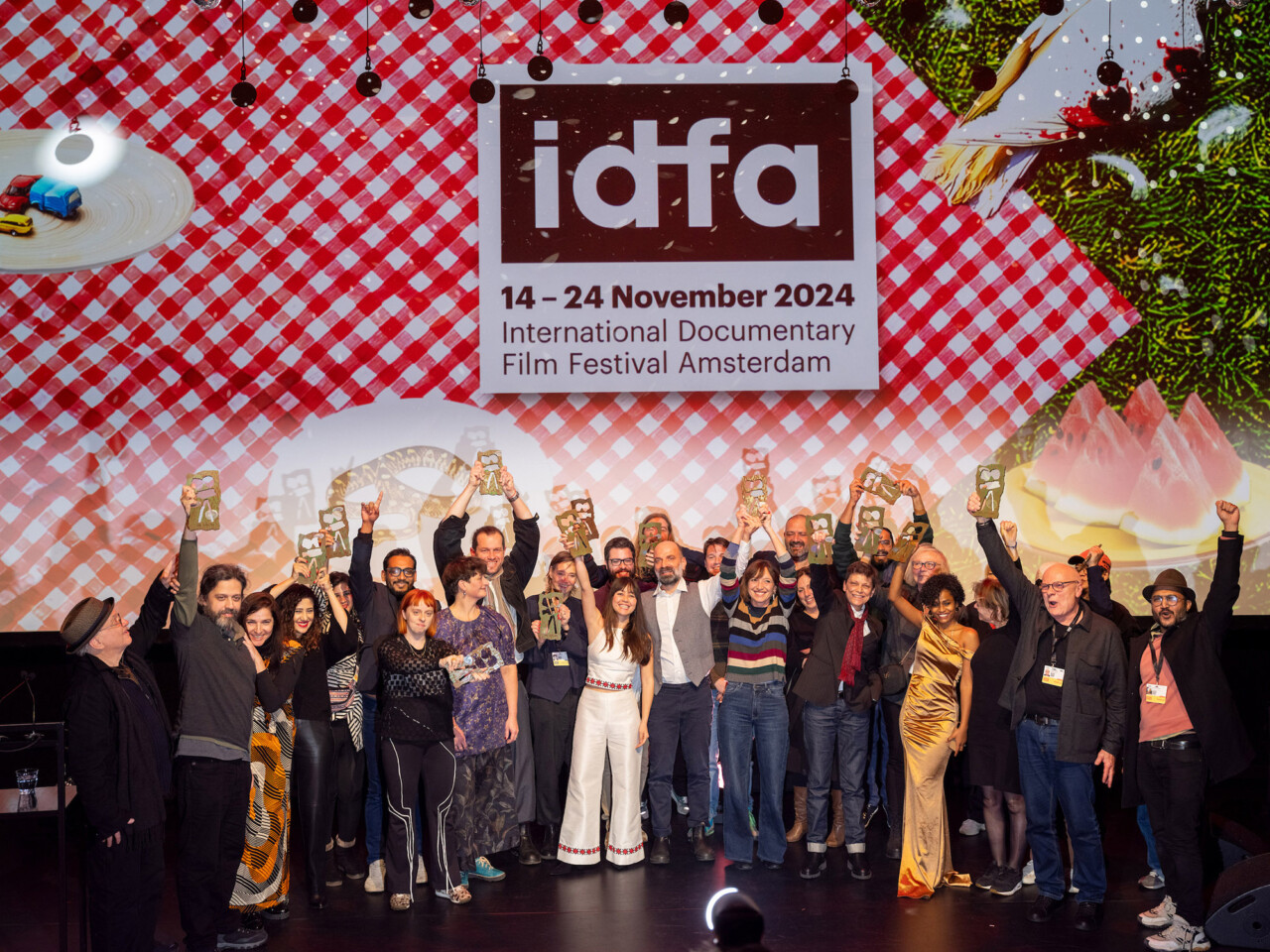
Closing ceremony of the 37th International Documentary Film Festival Amsterdam (IDFA). / Photo: Roger Cremers, courtesy of IDFA 2024.
After the film’s screening in the international competition section of IDFA 2024 and receiving the FIPRESCI Prize, has ‘Writing Hawa’ been invited to other film festivals?
Yes, but I can’t mention all the festivals. The film has already been confirmed for several festivals, including the FIPADOC, which will host the film’s premiere in France. The film will also have its North American premiere and will be screened at several other European festivals. Some of the programmers from other festivals were present at this year’s IDFA and selected the film there. Additionally, the film has received multiple invitations from other festivals as well.
I believe ‘Writing Hawa’ is a film that can also attract a general audience. It’s a very audience-friendly film, and I hope it receives a good reception. The film’s North American premiere is especially important to us because public opinion in the US to the film’s subject matter is crucial. The US played a key role in the handing over of Kabul to the Taliban, and this issue has largely been silenced and overlooked in global media coverage.
Has a decision been made regarding the television broadcast of the film?
Arte in France, which is one of the co-producers of ‘Writing Hawa,’ will be broadcasting the film on Arte TV in the spring of 2025.
Given the audience’s reception, the positive reactions from critics, and the success of the film at IDFA, have you ever thought to yourself that you wish you had taken on the role of producer for this film?
Honestly, no. Although I do have experience in producing, the responsibility of a producer is immense, and I tend to produce projects where I can use my presence and connections to help them reach the international stage. Najiba had an amazing team of producers and the Arte network supporting her, and as an editor, I had complete creative freedom. Both the producers and Najiba placed a lot of trust in me, and as an editor, I was able to devote all my time and energy to making a creative impact on the project, without having to worry about management issues or paying salaries, as I would if I were the producer.
Do you currently have any projects in development or production?
I’m currently filming my new project, and we are in the middle stages of production. It’s a film I’m directing, and the events of the story take place in Iran.
Also, since my previous collaboration with Najiba Noori went very well, we decided to work together again on her next project, which is about Afghanistan. This project is also in production.
Note: This interview was originally conducted in Persian, published in Persian on Filmpardaaz.com and in English on en.filmpardaaz.com .

